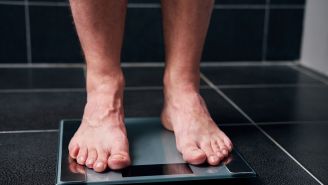Updated on May 5, 2023.
You might be doing everything right when it comes to losing weight—choosing the right foods, counting calories, getting exercise—but then your own biology seems to throw a wrench into the works.
As we learned in the second installment of our Science of Weight Loss series, the more you reduce your calories, the more your metabolism drops to preserve your body weight—exactly the opposite of what you want!
Meanwhile, if you’re not minding other aspects of your lifestyle—getting enough sleep and exercise, managing your stress—your hormones can kick in to boost cravings for exactly the kinds of food you know you should be avoiding.
Ready to throw in the towel?
Don’t.
Darria Long Gillespie, MD and Keith W. Roach, MD are here to say you can still win at weight loss, as long as you are willing to put in the effort.
In this third installment of The Science of Weight Loss, Dr. Gillespie and Dr. Roach help us make sense of hormones and the role they play in our weight—and why exercise is much more important than a way to burn calories.
When it comes to weight loss, what hormones do we need to know about?
Dr. Gillespie: For starters, there’s ghrelin and leptin. On the most basic level, ghrelin tells us to be hungry and leptin tells us to stop eating. But readers may be surprised to know that we can influence both of those. In fact, what we eat—along with a range of lifestyle factors—has an effect on both leptin and ghrelin.
There was a study done not long ago looking at people eating milkshakes. One milkshake was labeled “sensible” and the other was labeled “indulgent,” but in reality, both milkshakes were exactly the same. As it turned out, after drinking the “indulgent” shake, subjects’ levels of ghrelin—the hunger hormone—decreased and people felt full.
So hormones play a pretty significant role in how we experience hunger?
Dr. Roach: They do, yes.
The essential energy balance equation—calories in and calories out—is still in effect, but when hormones come into play you may want to take in more calories than you're going to be able to expend under certain circumstances.
That’s why we have to take hormones—and the factors that influence those hormones—into account when we work with people to lose weight successfully.
What can we do to make sure our hunger hormones are in the right balance?
Dr. Gillespie: For starters, getting adequate sleep and exercise—entirely independent from its effect on burning calories—can help.
We know that not getting enough sleep can disrupt your leptin levels. That means that when you’re tired, your body is less able to signal and receive that “fullness cue,” leading you to eat more.
And exercise can also help regulate leptin levels, so that we can hear and respond to that fullness cue even more clearly. In all, both sleep and exercise help us to be more sensitive to leptin.
There’s also cortisol, which has its own impact.
Cortisol is essentially a stress hormone, correct?
Dr. Gillespie: In a nutshell, yes.
On the “calories in” side of the equation, high levels of cortisol appear to cause us to have more cravings for high-fat and sugary foods.
Does that explain why when we’re stressed out, we tend to reach for comfort foods—a candy bar instead of, say, baby carrots and hummus?
Dr. Gillespie: Yes, that plays a large part.
One of the purposes of cortisol is to make sure our body has sufficient energy stores for an upcoming stressful event. So, for one, it increases our appetite, particularly for foods that are very calorie-dense, like those comfort foods.
It also switches our body to fat-storage mode to create an “energy reserve”—particularly storing energy as visceral, or abdominal, fat.
What biological benefit could there be to piling on belly fat?
Dr. Gillespie: Think about our caveman (or cavewoman) ancestors and the kinds of stressors they confronted.
You’re out hunting and gathering, and suddenly a saber-toothed tiger appears. Our levels of cortisol and norepinephrine—another stress hormone—would jump, and we’d outrun the tiger. Well, ideally, at least…
In the moment, that cortisol burst gives you an extra shot of blood glucose so you have the energy to avoid the threat. When the danger passes, the cortisol also tells our bodies to take in some calorie-dense food to replenish our stores—and to pack away the extra as fat to have at the ready the next time the tiger comes calling.
That makes sense, but we don’t have saber-toothed tigers to worry about anymore. So why even worry about cortisol?
Dr. Gillespie: True, we don’t have tigers popping up these days. But our stressors are far more insidious, chronic and, as a result, worse for our health.
Back in the day, once the caveman outran the tiger—assuming he did, because if he didn’t he probably didn’t pass his genes on to us anyway—his levels of stress hormones would normalize and he’d relax.
But today, that normalizing doesn't happen as much for us. We don't have tigers, but we have bills, emails, responsibilities. They don’t come and go and allow our levels to normalize. Instead, our stressors are constant, daily, keeping us up into the night and keeping our stress levels chronically high—which our body was not designed for.
Dr. Roach: And that’s where stress can cause weight control to go haywire.
Those elevated cortisol levels are causing your body to preferentially put energy from food into your visceral fat. But then, when calories are continuously being turned into fat, you're left with less energy to use in the moment you need it—to meet that deadline at work, for example—so what are you going to do?
You're going to eat more.
And that visceral fat, by the way, is the kind associated with increased risks of type 2 diabetes and heart disease.
Cortisol becomes a problem when it’s elevated over time as a result of chronic, unyielding stress. And those consistently high cortisol levels promote fat storage. Is there anything you can do to get your cortisol levels in check?
Dr. Gillespie: Yes, there absolutely is, and I’m glad you asked!
Anything you can do to control stress, and thereby normalize cortisol levels, helps. That doesn’t mean you have to fix the world in one fell swoop. But by making small adjustments, you can change your reaction to stress, which is all that matters to your body. You can try meditation, deep breathing, yoga. Good old aerobic exercise or strength training works, too.
Though outrunning a tiger was no picnic, our ancestors benefited from that burst of exercise to help flush their systems of excess cortisol. Modern-day stress doesn’t involve a sprint to escape danger, but rather looks more like sitting at a desk and worrying.
So, as I often tell people, we need to replicate some of that caveman existence. Literally, go work out that stress. Go for a jog. Walk. Dance.
I do all of these, often in the same day, and it’s crucial for keeping my stress levels and health in check—not to mention my sanity.
So get your exercise, sleep and relieve stress and you’re golden?
Dr. Gillespie: Those are all good moves, but for weight loss, we have one more hormone to consider.
Dr. Roach: That’s insulin, which your pancreas produces. Insulin is your body’s way of saying, "There's enough energy right now, it's time to put it away."
The sugar in your blood—your body’s source of energy—will travel to where it's needed, when it’s needed, in your muscles and your heart. When you have enough energy for your needs, insulin signals to put the excess away.
The problem is, as people gain weight, we become resistant to insulin—we’re not as sensitive to its signals—and so insulin levels in the blood will get higher and higher.
You may not be overtly diabetic, but you have high levels of insulin. And that makes it harder and harder to lose weight because your body's response to insulin is to make more fat.
In other words, the heavier you get, the more insulin resistant you become, so the body has to pump out more insulin to do the job it needs to do?
Dr. Roach: Yes, and in order to break that vicious cycle, you've got to start losing the weight and ideally changing what you're eating so as to stimulate less insulin. Because at some point your pancreas will say, "I just can't do this anymore."
Then your body is not able to respond by producing enough insulin, given your level of insulin resistance. And the next thing you know, you've got type 2 diabetes.
Diet is key, but so is exercise. Not only does exercise burn some—though not a lot—of calories, but it offers all sorts of other supportive benefits for weight loss, too.
Dr. Gillespie: Absolutely. Exercise directly affects calories out, but it’s about more than that. It provides a boost to your basal metabolic rate. It changes your leptin levels and lowers your cortisol levels, which affects how much food you take in. It also increases your sensitivity to insulin, so insulin levels don’t have to continually rise.
Dr. Roach: And even for someone who doesn't have weight issues, exercise is good for innumerable reasons. It protects your lean body mass, it keeps your bones strong and it helps with your mental health by reducing anxiety and helping to reduce your risk of depression. Not to mention, the effects on your arteries and your heart are really quite profound.
If you were to take your RealAge test, you'd find that increasing your exercise from a sedentary level to an optimal level can make your RealAge four, five, even six years younger.
Alright, we’re building our weight loss toolkit: sleep, exercise, stress reduction. Now we need to make sure we’re fueling our efforts the right way.
Stay tuned for the next installment of The Science of Weight Loss: How to Choose the Right Foods to Fuel Your Weight Loss.
Darria Long Gillespie, MD, MBA, FACEP, is an emergency department physician and clinical assistant professor at the University of Tennessee School of Medicine.
Keith W. Roach, MD, FACP, is associate professor of clinical medicine at Weill Medical College of Cornell University in New York City and an associate attending physician at New York-Presbyterian Hospital.






